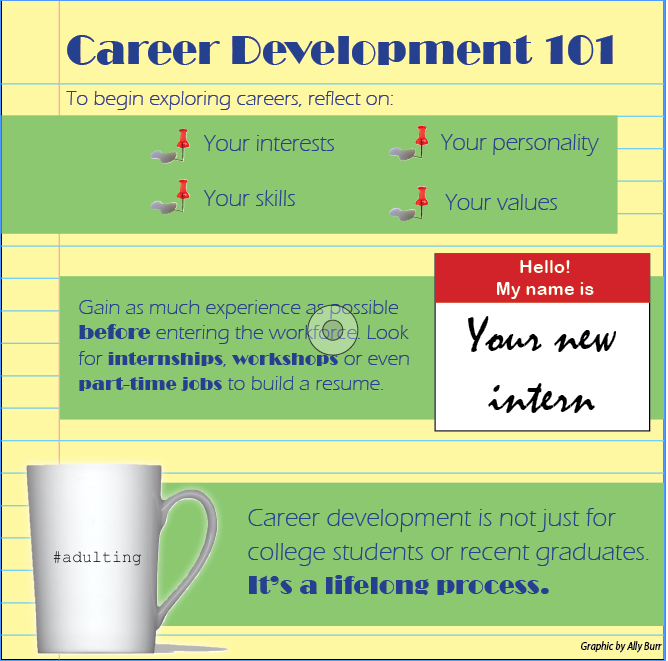How Washburn prepares students for post-grad life
January 22, 2018
Many students are familiar with the specific tilt of the head that precedes the question, “So, what are you going to do with that degree?”
It’s not an unreasonable question. With tuition prices rising, students rush to beef up their resumes or pick majors that guarantee the ability to make payments. Hopefully, when one picks a major, it falls in the overlapping area of the Venn diagram between the circles that contains enjoyable things and being employed. To combat the fear of unemployment after graduation, multiple departments at Washburn University have begun to add classes or courses to their programs.
“I was a student here back in the ‘80s, and none of that was ever talked about,” said Michael Hagar, chair of the art department. “It was that ivory tower type of mentality where we teach you, but you figure everything else out. Well, that’s changed. That is old school, and it’s ridiculous.”
Now, colleges across the nation, including Washburn, have begun to mold their programs to better prepare students for the job market.
“I sit on the career services advisory board, where employers from the community as well as faculty and staff from campus get together and talk about what can we better do to help out students with this transition, and within that. We often hear from employers that they really wish faculty would never give partial credit or accept things late,” said RaLynn Schmalzried, an assistant professor of psychology. “Once you’re out in the workforce, a deadline is a deadline and no, you can’t get partial credit for it, you missed it, or you show up 20 minutes late for class regularly or miss regularly, that’s going to impact your performance and likelihood of keeping the job.”
The first step, of course, is getting interviews for either master’s programs or jobs in the first place.
“[In] the sociology and anthropology club, we will periodically have little workshops for students to help work on their CV, and help them draft letters of intent or research statements,” said Alexandra Klales, an assistant professor in the anthropology department. “If they are thinking of going to grad school or even a job, getting help with your resume and your cover letters or your CV and your statements for the universities are really important.”
While certain departments have specific programs that are tailored to their areas of expertise, the three fields of anthropology, psychology, and art all agree on two main points: classes are needed to help students transition out of a university setting and internships in these fields are invaluable.
The psychology and art departments have similar classes that are required to make sure students know how to sell themselves to employers.
According to Dr. Schmalzried, as of a few years ago, students are required to take Classroom to Career, PY 385, on top of the already existing Psych forum, PY 299, to ensure that students can communicate to interviewers how their schooling has prepared them and developed the skills necessary for the occupation they are pursuing.
The art department’s parallel courses, entitled Art Forum and Bachelor of Fine Arts Professional Practices, help its students by discussing resumes, letters of recommendation and related items. All three departments also either highly encourage or require students to complete an internship before graduation.
“Doing an internship gives [students] things like time management, organizational skills, leadership skills, analytical skills they can apply to a wide variety of fields,” said Klales.
In the art department, things work similarly.
“We have developed more vocation looking kind of end game for students,” said Hagar.
It is important to realize that people can acquire work that doesn’t match exactly what is printed on their diploma.
“When you search Indeed or any of the job sites, a lot of them aren’t going to say a requirement is a bachelor’s of Psychology, which gives rise to this idea that you can’t do anything with a bachelor’s in Psychology,” said Schmalzried. “There’s a lot of jobs out there that have a related field in their requirements and it takes some work on the student to show them how, and not trying to spin, or lie, or tell the story, but truly how their psychology courses are equivalent to the skills that their employer is looking for. Tailor every [application], tailor every cover letter.”



